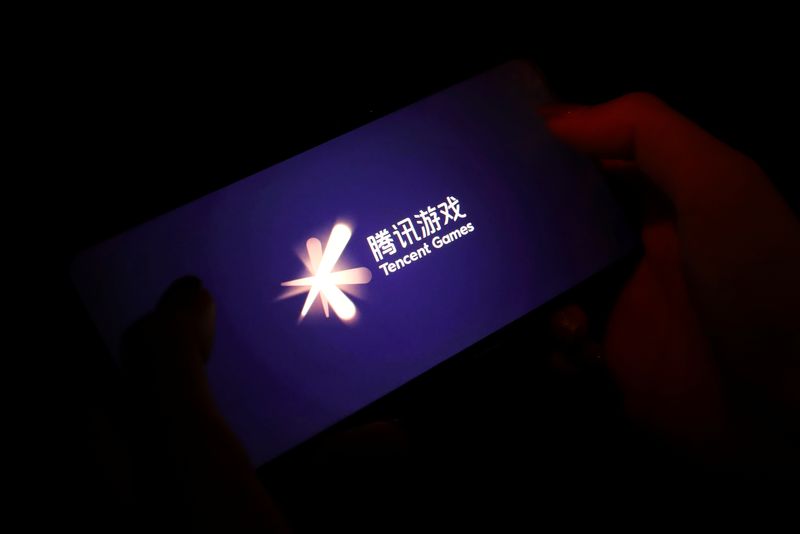By Josh Ye
HONG KONG (Reuters) - China's end to a sweeping crackdown on its video games market is expected to breathe life back into the battered industry this year, but remaining restrictions on some content and economic headwinds will limit the extent of the recovery.
Beijing’s tough curbs in 2021 laid waste to the once-booming industry, shaving over half of the market value of sector leaders like Tencent Holdings (OTC:TCEHY) and NetEase (NASDAQ:NTES) Inc and shrinking the world’s biggest gaming market for the first time.
Shares of Tencent, the world's largest gaming company, and NetEase rose this week after China's video games regulator granted the first gaming licences in 2023, the latest sign that the clampdown is ending.
Analysts expect China to approve between 800 and 900 games this year, potentially more, topping the 512 titles released in 2022 and 755 in 2022. Between August 2021 and March 2022, no titles were approved.
"We believe the approvals indicate a more benign regulatory environment for the China gaming industry," JP Morgan analysts wrote in a note on Wednesday. "With rich game supply, we are more positive on overall online game market growth during Chinese New Year, a traditional strong season for the China online game market."
The crackdown was aimed at curbing gaming addiction among youth and purging content the government did not approve of, with companies asked to delete content that was violent, deemed to celebrate wealth or foster the worship of celebrities.
That sent game sales in China tumbling more than 10% to 269.5 billion yuan ($40.1 billion) in 2022, the first decline since figures became available in 2003, according to a report by CNG, a government-backed industry data firm.
In November last year, Tencent, the world’s biggest gaming company, reported its domestic gaming revenue shrank 7% in the third quarter. Its overall gaming revenue fell 4.45%.
Shares of Tencent, China's most valuable company, dropped 24.7% in 2022 but have risen 21% so far this year, recouping nearly all of last year's losses. NetEase's Hong Kong stock, which dropped 27.3% in 2022, is up 21.4% this year.
Tencent and NetEase did not respond to request for comment.
REGULATORY THAW
Also providing investors some cause for hope are the larger budgets of the games now being approved, a sign publishers are willing to invest more in the improving regulatory environment.
Since December, titles such as Tencent’s Valorant, NetEase’s Justice Mobile and miHoYo’s Honkai: Star Rail have been granted licenses, the biggest ticket items since August 2021.
In December, Chinese regulators approved 44 foreign games, the first to be given the green light in 18 months and widely seen as the last regulatory hurdle to be removed, inspiring hope for foreign developers to re-enter China again.
Citi analysts said if approval announcements normalise further, more games will potentially be approved than their current forecast of between 800 and 900 licences. “Among the gaming studios, we see higher upside risks on game revenue rebound for Tencent,” they added.
That said, some regulatory restrictions imposed by Beijing are here to stay. Most notably, in September 2021, China banned under-18s from playing games for more than three hours a week, a rule that has forced Tencent and its peers to give up targeting youth gamers.
Tencent said in November the total time under-18s spent on its games had plunged 92%.
For the upcoming Lunar New Year holiday, Tencent and NetEase have implemented rules to limit under-18s from playing games for more hours than legally allowed, in line with recent practice for other major holidays.
Strict control on game content will also remain, barring popular but violent games such as Grand Theft Auto from entering China.
Whether the gaming market can return to form also depends on the recovery of the Chinese economy, which has been thumped by a surge in COVID infections.
Citi analysts said the unprecedented game sales decline last year was also likely due to mobile gamers remaining "more price-sensitive on discretionary entertainment spending amid a weak" macro economic environment.

However, data shows China’s total gamer population remains stable, slipping just 0.33% in 2022 from 2021 to 664 million.
"In 2023, China’s online gaming will get back to growth, but (it won't be) huge at all," Chenyu Cui, an analyst at research firm Omdia said. "Growth will be slow and gradual."